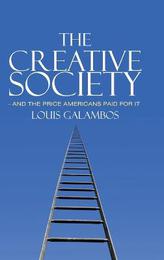
|
The Creative Society - and the Price Americans Paid for It
Hardback
Main Details
| Title |
The Creative Society - and the Price Americans Paid for It
|
| Authors and Contributors |
By (author) Louis Galambos
|
| Physical Properties |
| Format:Hardback | | Pages:336 | | Dimensions(mm): Height 235,Width 159 |
|
| ISBN/Barcode |
9781107013179
|
| Classifications | Dewey:331.7109730904 |
|---|
| Audience | | Tertiary Education (US: College) | | Postgraduate, Research & Scholarly | |
|---|
| Illustrations |
1 Line drawings, unspecified
|
|
Publishing Details |
| Publisher |
Cambridge University Press
|
| Imprint |
Cambridge University Press
|
| Publication Date |
19 December 2011 |
| Publication Country |
United Kingdom
|
Description
The Creative Society is the first history to look at modern America through the eyes of its emerging ranks of professional experts, including lawyers, scientists, doctors, administrators, business managers, teachers, policy specialists and urban planners. Covering the period from the 1890s to the early twenty-first century, Louis Galambos examines the history that shaped professionals and, in turn, their role in shaping modern America. He considers the roles of education, anti-Semitism, racism and elitism in shaping and defining the professional cadre and examines how matters of gender, race and ethnicity determined whether women, African Americans and immigrants from Europe, Asia, Latin America and the Middle East were admitted to the professional ranks. He also discusses the role professionals played in urbanizing the United States, keeping the economy efficient and innovative, showing the government how to provide a greater measure of security and equity, and guiding the world's leading industrial power in coping with its complex, frequently dangerous foreign relations.
Author Biography
Louis Galambos is Professor of History at Johns Hopkins University, where he also serves as Editor of the Papers of Dwight David Eisenhower and Co-Director of The Institute for Applied Economics, Global Health, and the Study of Business Enterprise. He is the author of numerous books on modern institutional development in America, the rise of the bureaucratic state and the evolution of the professions, most recently Medicine, Science, and Merck (with Roy Vagelos, 2002). He is co-editor of two Cambridge series and has received widespread recognition for his development of the 'organizational synthesis' of modern US history.
Reviews'Louis Galambos delivers a dazzling history of the modern United States as formed by its managers, scientists, diplomats, planners and lawyers. The hopeful message is that, more often than not, American expertise and innovation will save the day.' Jay Hancock, economics columnist, The Baltimore Sun 'The Creative Society is a bold, provocative, and compelling reinterpretation of perennial dilemmas in American society written by an historian at the top of his game. Louis Galambos brings his 'organizational synthesis' to life by evoking the experiences that animated the new professionals - in education, business, government, foreign policy, and urban life - who have made America work since the 1890s. This is history at its best: thoughtful, captivating, witty, and wise. Everyone who reads The Creative Society will gain a new understanding of key crises in American history - and novel insights to make sense of the challenges we face today.' Jeffrey L. Sturchio, Senior Partner, RabinMartin and former president and CEO, Global Health Council 'Louis Galambos is equally adept as storyteller and historian. Witty, readable, illuminating, and sometimes highly personal, this is a history book with the drama of a novel. Professor Galambos charts twentieth-century American development in four broad areas - urbanization, innovation, economic security, and internationalism - and weaves throughout these concurrent narratives an astonishing array of detail. His cast of characters is America's self-proclaimed and educated professionals. Lawyers, economists, nurses, urban planners, mining engineers, teachers, and even military strategists act out a historical pageant that boasts winners and losers. Most vividly, Galambos stirs his own family story into the mix. His small-town Ohio clan of bustling Hungarian emigrants shares the stage with prominent twentieth-century figures like Emma Goldman, George Marshall, and Robert Moses. And in a masterstroke of history writing, he invites us, his readers, to enhance his storytelling with reflections on our own American experience.' Mary Yeager and John Lithgow, Los Angeles, California
|